Books
Books
in random order
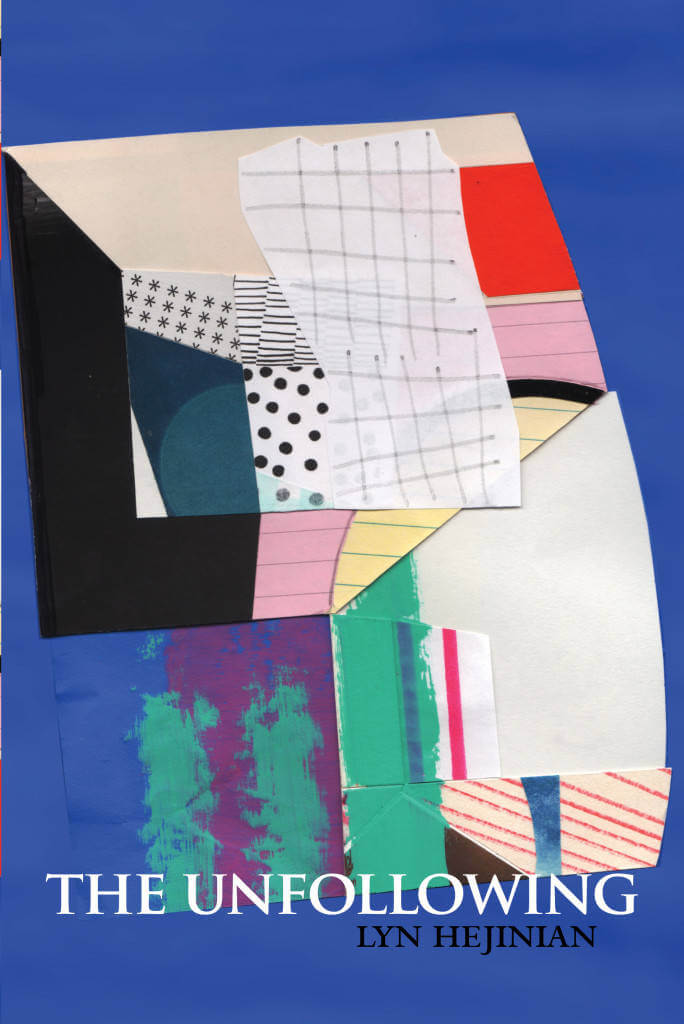
The Unfollowing
The Unfollowing is a sequence of elegies, mourning public as well as personal loss. The grief is not coherent. Though the poems are each fourteen lines long, they are not sonnets but anti-sonnets. They are composed entirely of non-sequiturs, with the intention of demonstrating, if not achieving, a refusal to follow aesthetic proprieties, and a rejection of the logic of mortality and of capitalism. As the author sees it, outrage, hilarity, anxiety, and ribaldry are not easily separated in the play of human emotions. And they are all, and sometimes equally, the proper, anarchic medium for staying alive.

Tense (Silver Edition)
Tense is a never-realised publication, written and composed by Lucy Lippard and Jerry Kearns in 1984, that only now has been released in a very limited run on our imprint. The book accompanied the exhibition Top Stories, which took a closer look at the 29 issues of the prose periodical with the same title, founded in the late 1970s by Anne Turyn.
Top Stories was dedicated to fiction by emerging women artists and writers from that time. Tense was originally intended to become part of the series as well, but never made it to print. It was only recently – during the making of the exhibition at Amsterdam’s Kunstverein – that the original mock-up was retrieved from the editor’s archives and finally sent off to the printer.

Inland Empire
‘Inland Empire’ is a film by David Lynch about a once-feted Hollywood actress who is cast in a movie that is rumoured to be cursed. From a queer, feminist perspective, film critic Melissa Anderson examines how Lynch’s late masterpiece is not only a brilliant evocation of how images work on the mind, but how powerful “acteurs” are in the creation of dreamlike cinema. Laura Dern’s astonishing performance, as the film’s realities splinter and identities multiply, is elucidated by Anderson through her deep affection and respect for Lynch. The book is part of the Decadent Editions series, which examines one film for every year of the 2000s, each a milestone of contemporary cinema.

The Mollino Set
New York-based professor Lytle Shaw journeys to Italy in this adventurous exploration of the life and work of architect, designer, and photographer Carlo Mollino (1905–1973). In 1933 the young Mollino received a commission from Mussolini’s regime for his first building: an administrative centre in Piedmont. Later works include furniture and interior design, a book on photography, and an asymmetrical car that raced at Le Mans in 1955.
The book centres around Shaw’s realisation that this prolific talent’s conflicted legacy offers a unique window on the role that post-war Italian politics and culture played in the country’s reimagining of itself as a victim, rather than a proponent, of fascism.

Image RIP: After Printing, Work & Planet Earth
Image RIP, the first publication from Source Type, is centered around New York graphic designer Geoff Han’s investigation into the Shenzen-based printer Artron and explores subjects ranging from design, production, work, and the environment in the post-industrial economy. The book gathers essays by Danielle Aubert, David Bennewith, Geoff Han, Ming Lin, Shanzhai Lyric, David Reinfurt, Mindy Seu, and Dena Yago, and features images by Ann Woo. Image RIP reflects a consistent theme in Han’s practice of the manipulation of image reproduction, printing, production, code, and other techniques to affect the process of viewing and reading.

Writing on Raving
McKenzie Wark, Zoë Beery and 1 more
Writing on Raving is the definitive mix of voices from the Brooklyn underground rave scene and beyond, providing fresh language for the shared and infinitely varied experience of dancing through the night until the morning.
New York rave culture is having a moment. The music, mostly, is techno, certain flavors of which became the soundtrack to a dancefloor culture that is queer in a different way to house music centered gay nightlife. Wark, Mak and Beery want to document and annotate and celebrate, but also critique, this world in the making. Writing on Raving centers the New York scene, but isn't limited to it.
This is a book for all of those who need the rave. Who need to dance. Who have at some point needed that beat in their lives. This is a book for all those who have journeyed through the night, through sound, through movement, through chemistry, into other places, other times, other encounters.
This seeking gives us hours, years, on the dance floor to think about why we rave, to locate these reasons in our bodies and the space around us. But the rave is not the place to articulate them. It is too loud; our friends are too distracted, or too high. At the afters, tired and drained and covered in schmutz, we think some more. We look around at our raver friends, and wonder: How did we get here? What happened to us? What is this tentacular, thrashing, swelling thing that we all made together? That thing that is now slumped and aching and coming down now into our fragmentary, singular lives
Between all of us, there are many answers to such questions. Wark, Mak and Beery have gathered their favorite ones to share in this first-ever anthology of writing on raving.
McKenzie Wark is a writer and scholar based in New York City. She is the author, among other things, of Raving (2023) and Life Story (2024).
Geoffrey Mak is the author of Mean Boys: A Personal History (Bloomsbury, 2024).
Zoë Beery is a freelance journalist based in Brooklyn, and a nightlife harm reduction organizer at parties and festivals in the U.S. and Europe.

Quiet Fires
Quiet Fires, the debut poetry collection from andriniki mattis, queries the everpresent questions of Black lives. Be it in a bakery in Brixton, London, at a corner on Malcolm X Blvd, Brooklyn, or the pews of Notre Dame, Paris – whether crossing violent borders on land or in gender, we know how it is to be in a familiar place that feels foreign.
As we follow along on bike rides over the Manhattan Bridge or sit alongside queer lovers in Bushwick, mattis reflects on the profound impact of pandemics, indifference, and heartbreak. In these lyrical and intimate poems that interrogate white spaces on the page and in the world with evocative metaphors, we wonder: “is there ever a party if you're always working this skin”— where can we feel safe and loved? In a world of climate change and the constant “twilight of violence”, be it gun violence or the expectations of capitalism, quiet fires erupt in these errant everyday moments. Centered around the experience of the Black queer, trans body, andriniki gabriel mattis uncovers the complexities of identity and the quest for self-discovery.
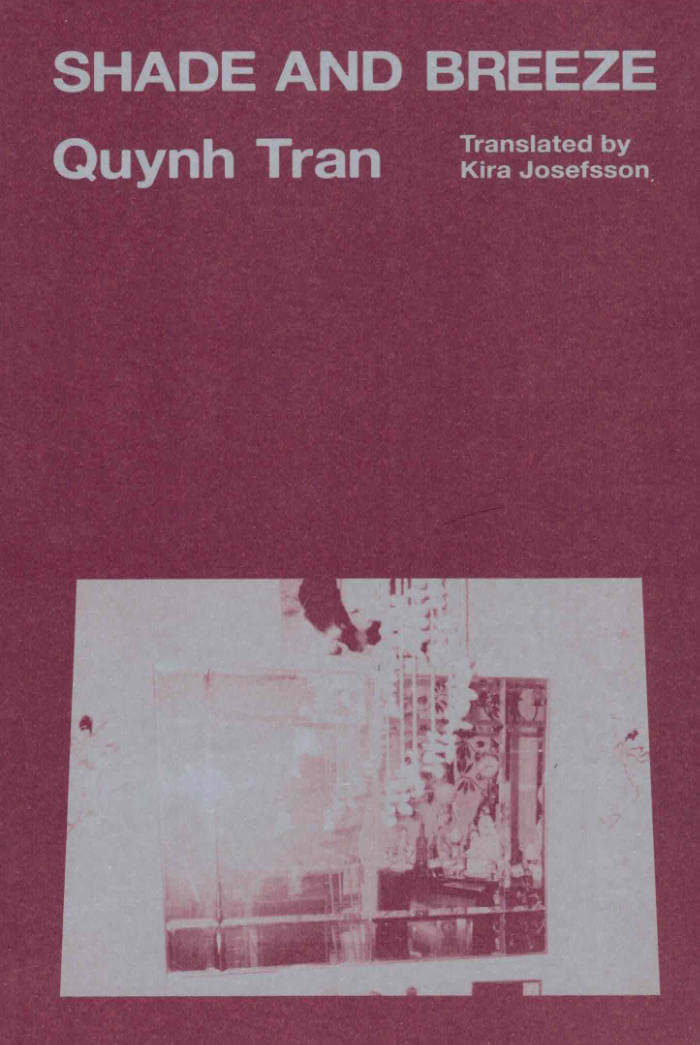
Shade and Breeze
Má dreams of wealth and grandeur, Hieu dreams of Finnish girls. The younger brother, always on the periphery, always an observer, gradually disappears into his schoolwork, mesmerised by his own intellect
The three of them form a solitary world in a small Ostrobothnian town on the west coast of Finland. Má and Hieu, constantly on a collision course with each other and the community’s suffocating social codes. They live among people who want to talk openly about everything, who don’t understand the necessity of sometimes remaining in the shade.
In sensitive and transfixing prose that has the effect of a series of tableaux, and with chapter headings reminiscent of the intertitles in a silent film, Tran’s multi-award-winning debut is a moving story about love, the compulsion to create, and the meaning of family.
Winner of the Runeberg Prize 2022
Winner of the Borås Tidning’s Debutant Prize 2022
Winner of the Svenska Yle Literature Prize 2021
Shortlisted for the Katapult Prize 2022

Or, on Being the Other Woman
Throughout this book-length poem, Simone White considers the dynamics of contemporary black feminist life, attesting to the narrative complexities of writing and living as a black woman and artist.
In Or, on being the other woman, Simone White considers the dynamics of contemporary black feminist life. Throughout this book-length poem, White writes through a hybrid of poetry, essay, personal narrative, and critical theory, attesting to the narrative complexities of writing and living as a black woman and artist. She considers black social life—from art and motherhood to trap music and love—as unspeakably troubling and reflects on the degree to which it strands and punishes black women. She also explores what constitutes sexual freedom and the rewards and dangers that come with it. White meditates on trap music and the ways artists such as Future and Meek Mill and the sonic waves of the drum machine convey desire and the black experience. Charting the pressures of ordinary black womanhood, White pushes the limits of language, showing how those limits can be the basis for new modes of expression.

The Original 1939 Notebook of a Return to the Native Land: Bilingual Edition
The first bilingual edition of this radically original work.
Aimé Césaire's masterpiece, Notebook of a Return to the Native Land, is a work of immense cultural significance and beauty. This long poem was the beginning of Césaire's quest for négritude, and it became an anthem of Blacks around the world. Commentary on Césaire's work has often focused on its Cold War and anticolonialist rhetoric—material that Césaire only added in 1956. The original 1939 version of the poem, given here in French, and in its first English translation, reveals a work that is both spiritual and cultural in structure, tone, and thrust. This Wesleyan edition includes the original illustrations by Wifredo Lam, and an introduction, notes, and chronology by A. James Arnold.

New Address II. Stereotypical Artist
What is an artists’ life made of? From the home to the studio, from the studio to the gallery, from one exhibition to the next, from one place to another – a suite of moves and a list of addresses. Tobias Kaspar’s work sheds light on the ambivalent position of the artist, taken in a web of social and economic relations: in the second volume of New Address, he uses the tone of the diary, combined with the code of the moodboard, to document the side aspects of the life of a “stereotypical artist.”
The book gathers black & white photographs taken between 2018 and 2024, during the installation or the opening of exhibitions; at performances, dinners, parties; in different homes and rooms Kaspar has been living in; and in the course of daily activities. Contrary to an exhibition catalogue, projects by the artist such as his line of jeans, or his series of bronze sculptures made from disposable packaging, are thus shown “in the middle of affairs.”
An additional booklet opens with a short essay by artist Mikael Brkic, reflecting on the “behind the scenes” logics, followed by a letter penned by writer Leif Randt, and a text in which curator Kari Rittenbach discusses Tobias Kaspar’s work in relation to the economics and aesthetics of display and fashion. It concludes with a list of artworks in the order as they appear in the main book.
Published with the support of Erna und Curt Burgauer Stiftung, Pro Helvetia, Kultur Stadt Zürich.
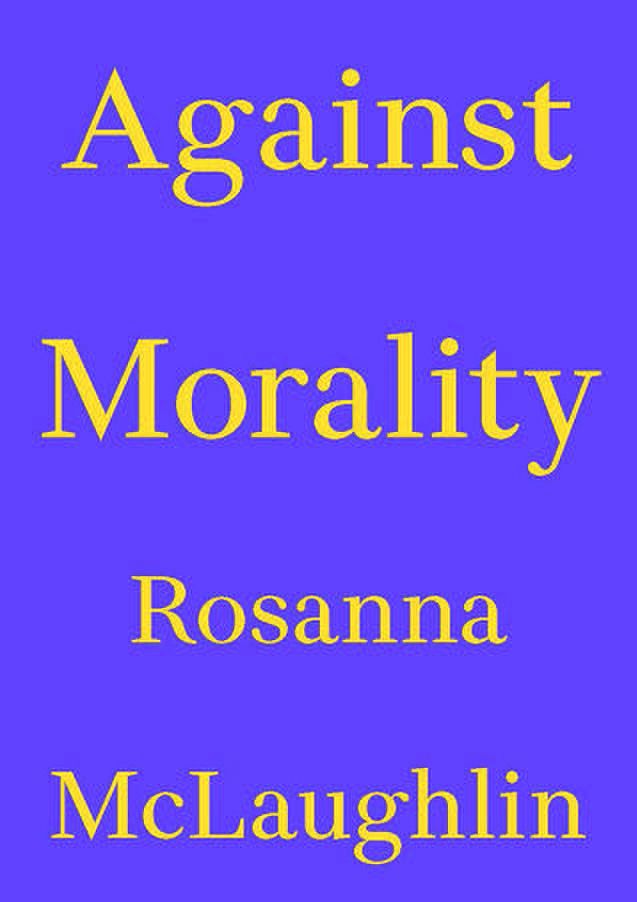
Against Morality
A manifesto against the current moralizing trend in the arts.
Should art be determined by political ideals? In recent decades art institutions have sought to embody liberal values of universal equality and social justice. This move toward greater inclusivity has borne witness to a countervailing trend: artworks are increasingly scrutinized for their political implications, and artists must take care not to transgress particular moral fault lines.
Examining contemporary exhibitions as well as works of art and film, and the broader cultural reactions to them, Rosanna McLaughlin investigates the consequences of this moralizing approach to creative work. She invites us to rethink the connection between political values and art—and to ask whether a relationship between them should exist at all. In arguing against morality in the arts, McLaughlin lays the groundwork for a more expansive concept of difference in twenty-first-century art making.
"What if ambivalences were seen as productive, and not a danger to erase? Would we not begin to know ourselves better? What is it that we are so afraid of finding out? Art is a testing ground for ideas, a means of reaching. What a shame, if we use the space it offers to destroy it entirely."
Rosanna McLaughlin is a writer based in East Sussex and the author of Double-Tracking: Studies in Duplicity (2019) and Sinkhole (2023). Her writing on art and culture has featured in ArtReview, Frieze, Granta, The Guardian, and The White Review, among other publications. Between 2021 and 2023 she was co-editor of The White Review.

Anxiety vol.1
Featuring poems and short stories by Coco Gordon Moore, Nate Lippens, Jimmy Cooper, Danielle Chelosky, Matthew Kinlin, and Thomas Moore, as well as an interview of Jack Skelley by Lydia Sviatoslavsky and photographs by David Catalano. Edited

Vostok
The theme was built around the idiom “VOSTOK”, the title given by Stéphanie Pécourt to her cycle dedicated to performative semantics, in which carte-blanches signed by guest curators at the Centre Wallonie-Bruxelles are deployed. Buried beneath several kilometers of ice, Lake Vostok acts as an invitation that both fascinates and refuses us. This sub-glacial lake on the edge of Antarctica, the largest identified, becomes the mirror-object of our desires and fears for the abyssal depths. The title of the program, Now I am a Lake, is taken from Sylvia Plath's poem Mirror (1961).
This booklet includes the scripts and texts of the performances, translated exclusively into French for the occasion, as well as images from the videos presented at the eponymous event. The compilation focuses on Sylvia Plath's poem Mirror, and includes an introductory text by curator Pauline Hatzigeorgiou.
edited by SB34
graphic design by Raphaëlle Serres / Solid Éditons
Contributions by Signe Frederiksen, Pauline Hatzigeorgiou, Margaux Schwarz, Hagar Tenenbaum, Sylvia Plath & Eleanor Ivory Weber

Language is a map of failures: Messy thoughts on reading, writing and dressing up
Afternoon Editions no. 3: Language is a map of failures. Messy thoughts on reading, writing and dressing up by Runa Borch Skolseg.
In May 2019, Time has fallen asleep in the afternoon sunshine relocated its base to the Oslo Biennale headquarters in Myntgata, with a room of its own and ongoing activities. Runa Borch Skolseg visited the space at several occasions before its final closure, in 2021. Her invitation to write for the Afternoon Editions bridges the move from one room to another, and is a reflection on how fashion can be a world of fantasy, and drama, a language we all communicate through. With a personal narrative she makes readings of clothes, literature and writing, and how they merge and enrich each other.

Jangal
Ana Pi, Léna Araguas and 2 more
Jangal est un ouvrage collectif avec la participation d’Ana Pi, Julien Creuzet, Léna Araguas et Éva Barois De Caevel. Il a été conçu lors de l’exposition « Cet ailleurs, qui rejaillit en moi, lorsque je suis là (…) » de Julien Creuzet à la galerie NaMiMa de l’École nationale supérieure d’art et de design de Nancy.

The TV Sutras
Inspired by visionaries like Moses, William Blake, and Joseph Smith, Bellamy spent five months in 2009 receiving transmissions from her television set and writing brief commentaries on each. The sutras and commentaries in the present volume are the beginning of an intensive investigation into the nature of religious experience. What are cults? Are they limited to wacko marginal communities, or do we enter one every time we go to work or step into a polling place? What is charisma and why are we addicted to it? Bellamy speaks candidly and intimately to her own experience as a woman, a writer, and former cult member. This commingling of memoir, fiction, collage and essay makes room for horny gurus, visitors from outer space, the tenderness of group life, and maybe the beginnings of a hard-won individualism.
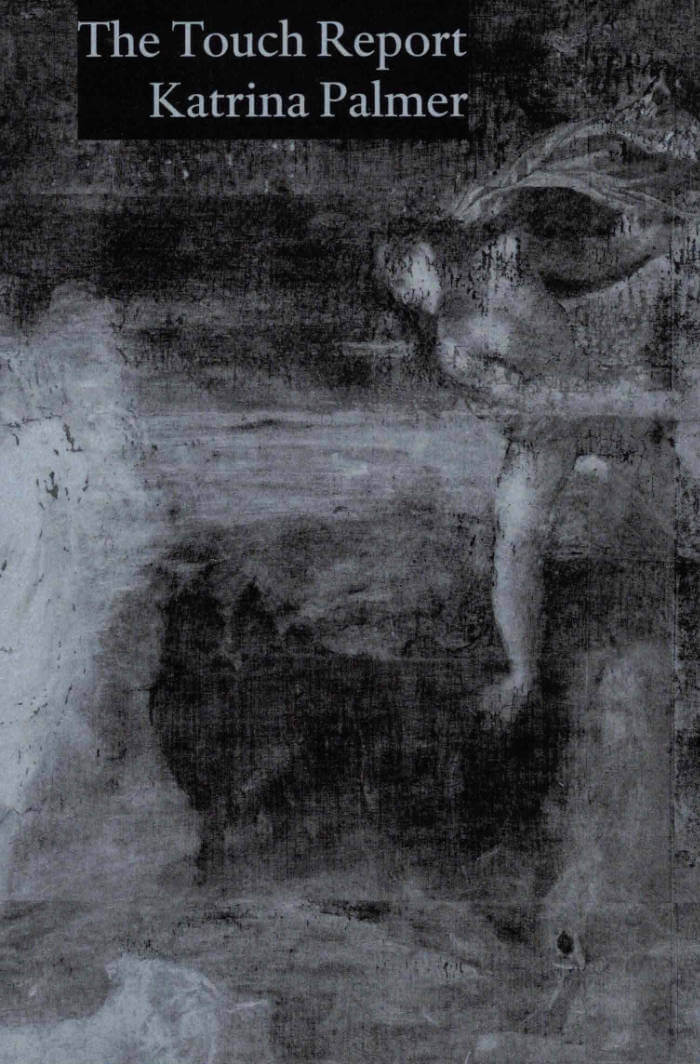
The Touch Report
‘Katrina Palmer’s The Touch Report asks a question that remains in motion for the duration of this extraordinary book. What is here? What’s still here? Here, Palmer writes an account of subjugation that is gestural, an on-going sequence of expulsions and punctures… Is there a kind of writing so transient it’s barely there? In Palmer’s writing, we encounter an ethics of presence and form that is deeply moving, completely and unbearably real.’ — Bhanu Kapil, author of How To Wash A Heart
An artist is invited to take up residency in a gallery filled with historical paintings. They are meticulously crafted, maintained, and revered. She begins to make an audit of the paintings, outlining the depictions of violence, subjugation and physical tension on public display. Eleven arrows in a torso, someone’s hair cut as they sleep, a man nailed to a cross. Horses, decapitations, memorable lobsters.
Written in sparse, urgent fragments that invite closer reading, The Touch Report, turns the reader’s gaze into the dark, to question our notions of ‘civilisation’.
Want to see something real, says the artist as she creeps through the darkness, keeping a log.
Katrina Palmer was commissioned by the National Gallery, London, as part of the 2024 National Gallery Artist in Residence Programme in collaboration with the Contemporary Art Society, generously supported by Anna Yang and Joseph Schull. This book is published as a result of research made during this residency.

Zona Festival
This book traces the legacy of Zona, Eastern Europe performance art festival that took place in Timișoara, Romania, between 1993 and 2002, years which were marked by a transition from communism to a new society built on different principles.
Bringing together artists from the former "Eastern Bloc," Zona became a space of encounters, a platform for theoretical discussions and postmodern art experiments, which displayed a remarkable diversity of artistic languages. The fall of the Berlin Wall, as Nicolas Bourriaud noted in his book "The Radicant", was the first decisive step towards globalization and the generalization of postmodern thought.
In the early 1990s, adopting subversive strategies helped artists overcome critical moments in totalitarian societies, which had been consolidated for decades in Eastern Europe. They combined techniques of expression such as pastiche, quotes, historical images, popular culture, or subcultures with personal mythologies. What resulted was often a critical mixture with an explosive effect. Body art became an appropriate language for critically analyzing stereotypes about the nation, religion, gender, or social prejudices and taboos. Body art facilitated the transfer of ideas and a dialogue with the audience, or it helped launch questions about identity politics. The concerns and intentions of the festival's protagonists were built around political, social, and artistic topics that were debated between the East and the West.
Essays by Ileana Pintilie, László Beke, Vladimir Bulat, Robert Fleck, Alexandra Titu, Berislav Valušek; artists' texts by Alexandru Antik, Matei Bejenaru, Ștefan Bertalan, Geta Brătescu, Oskar Dawicki, Ion Grigorescu, H.arta Group, Karen Kipphoff, Liliana Mericioiu, Dan Perjovschi, Lia Perjovschi, Sorin Vreme.

The Western
Tilghman Alexander Goldsborough
Tilghman Alexander Goldsborough’s, "The Western" is a speech-act, an oral poem to be told aloud. As Goldsborough writes in his 1080PRESS newsletter (reproduced with the book), “are we willing to salt the field of USAmerica in order to grow sth somewhere else?//” The Western mines the history of the WEST—reimagining its landscape within a gluttony of images. But what happens when the wrongs of the AMERICAN WEST meant to be right-ed, are so large, so intensely evil and vile that the English language itself spaghettifies around it? What new histories will be erected—of Samuel R. Delany, Walter Rodney, and others trampled and run over by the wet tech ravages of future-past, to take us all across the river?
"In THE WESTERN, Tilghman Alexander Goldsborough composes to facilitate decomposition, setting a place for language, reader in tow, to reimagine itself, to become the space and act of reimagination. From out of the dark:
[,,,, a vision ::
the future arrives ::
barefoot & confident /
fondue oozing a triumphant grin"
— Yeukai Zimbwa (The Columbia Review)
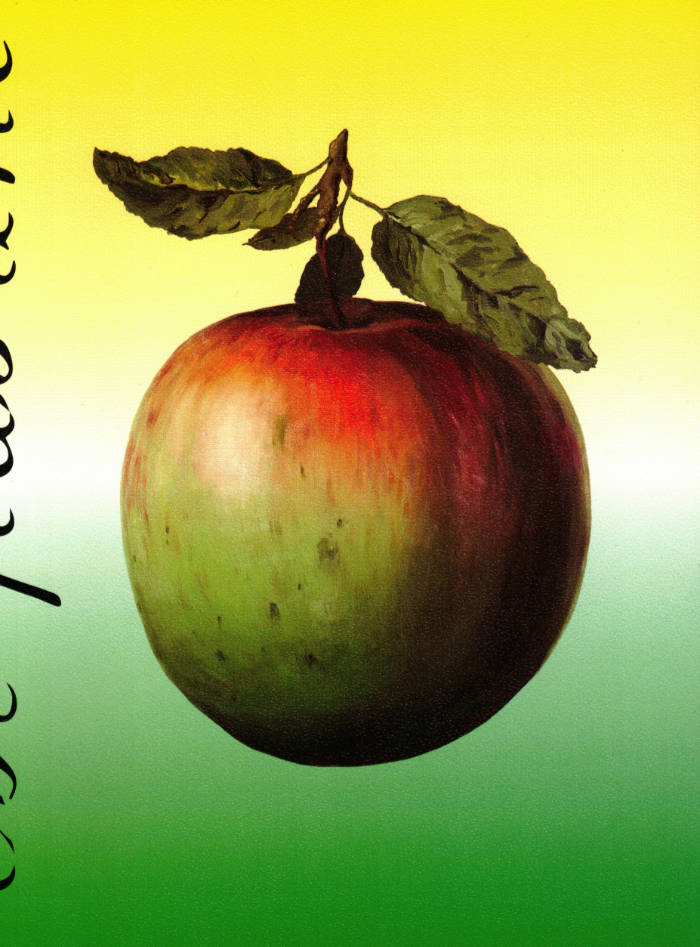
’Est Pas Une
By way of archiving, digital translation and reproduction, Philip Poppek extracts from Magritte’s word paintings twenty-six letters; segmental symbols of a textual system form an alphabet of a, with a familiar apple punctuating a provisional end to the sequence. A poetic correspondence with the letter a speculates on the prehistory of this alphabet, as though searching for some indication as to how we may have come to where we are now, in this ‘post-factual moment’.
Maybe at some point we fell into the foxes’ den, only to re-surface in a landscape of ruins. This book poses a number of necessary questions, perhaps beginning with: ‘Which feminine noun trails after the title script ‘est pas une?
Pomme? Pipe? Histoire? Communauté?

An Archive of Feelings
In this bold new work of cultural criticism, Ann Cvetkovich develops a queer approach to trauma. She argues for the importance of recognizing—and archiving—accounts of trauma that belong as much to the ordinary and everyday as to the domain of catastrophe. An Archive of Feelings contends that the field of trauma studies, limited by too strict a division between the public and the private, has overlooked the experiences of women and queers. Rejecting the pathologizing understandings of trauma that permeate medical and clinical discourses on the subject, Cvetkovich develops instead a sex-positive approach missing even from most feminist work on trauma. She challenges the field to engage more fully with sexual trauma and the wide range of feelings in its vicinity, including those associated with butch-femme sex and aids activism and caretaking.
An Archive of Feelings brings together oral histories from lesbian activists involved in act up/New York; readings of literature by Dorothy Allison, Leslie Feinberg, Cherríe Moraga, and Shani Mootoo; videos by Jean Carlomusto and Pratibha Parmar; and performances by Lisa Kron, Carmelita Tropicana, and the bands Le Tigre and Tribe 8. Cvetkovich reveals how activism, performance, and literature give rise to public cultures that work through trauma and transform the conditions producing it. By looking closely at connections between sexuality, trauma, and the creation of lesbian public cultures, Cvetkovich makes those experiences that have been pushed to the peripheries of trauma culture the defining principles of a new construction of sexual trauma—one in which trauma catalyzes the creation of cultural archives and political communities.
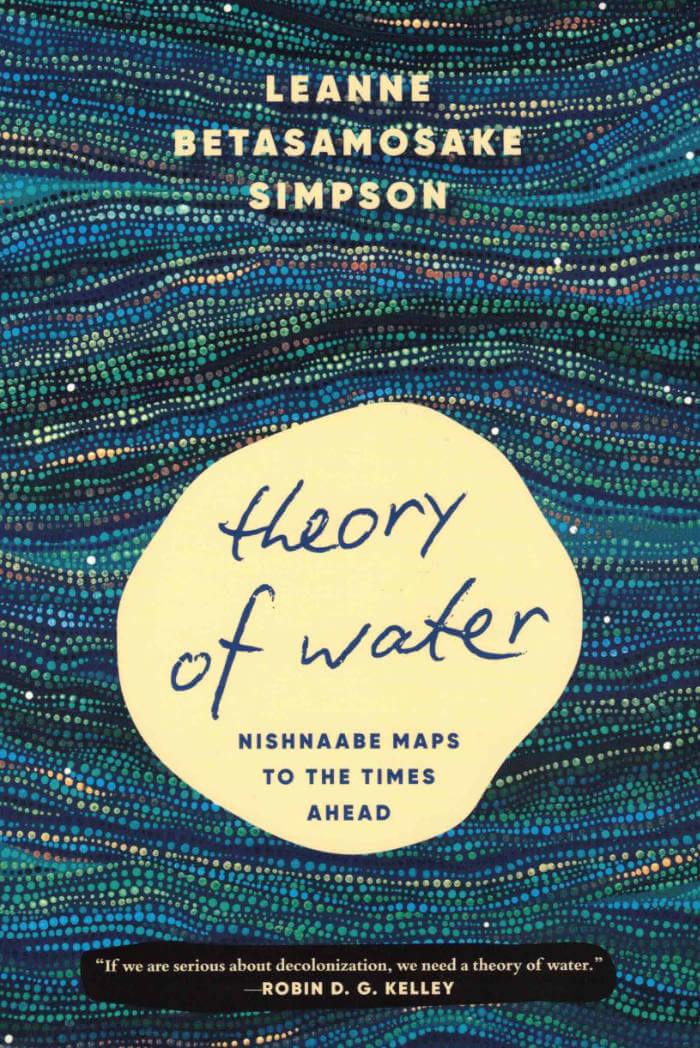
Theory of Water
A genre-bending exploration of that most elemental force—water—through Indigenous storytelling, personal memory, and the work of influential artists and writers.
For many years, Leanne Betasamosake Simpson took solace in skiing—in all kinds of weather, on all kinds of snow across all kinds of terrain, often following the trail beside a beloved creek near her home. Recently, as she skied on this path against the backdrop of uncertainty, environmental devastation, rising authoritarianism and ongoing social injustice, her mind turned to the water in the creek and an elemental question: What might it mean to truly listen to water? To know water? To exist with and alongside water?
So began a quest to understand her people's historical, cultural, and ongoing interactions with water in all its forms (ice, snow, rain, perspiration, breath). Pulling together these threads, Leanne began to see how a "Theory of Water" might suggest a radical rethinking of relationships between beings and forces in the world today. In this inventive work, Simpson draws on Nishnaabeg origin stories while artfully weaving the work of influential writers and artists alongside her personal memories and experience—and in doing so, reimagines water as a catalyst for radical transformation, capable of birthing a new world.
Theory of Water is a resonant exploration of an intricate, multi-layered relationship with the most abundant element on our planet—one that, as Simpson eloquently shows, is shaping our present even as it demands a radical rethinking of how we might achieve a just future.

PALESTINE +100: Stories from a century after the Nakba
Palestine + 100 poses a question to twelve Palestinian writers: what might your country look like in the year 2048 – a century after the tragedies and trauma of what has come to be called the Nakba? How might this event – which, in 1948, saw the expulsion of over 700,000 Palestinian Arabs from their homes – reach across a century of occupation, oppression, and political isolation, to shape the country and its people? Will a lasting peace finally have been reached, or will future technology only amplify the suffering and mistreatment of Palestinians?
Covering a range of approaches – from SF noir, to nightmarish dystopia, to high-tech farce – these stories use the blank canvas of the future to reimagine the Palestinian experience today. Along the way, we encounter drone swarms, digital uprisings, time-bending VR, and peace treaties that span parallel universes. Published originally in the United Kingdom by Comma Press in 2019, Palestine +100 reframes science fiction as a place for political justice and the safekeeping of identity.
Edited by Basma Ghalayini. Featuring Talal Abu Shawish, Tasnim Abutabikh, Selma Dabbagh, Emad El-Din Aysha, Samir El-Youssef, Saleem Haddad, Anwar Hamed, Majd Kayyal, Mazen Maarouf, Abdalmuti Maqboul, Ahmed Masoud & Rawan Yaghi.